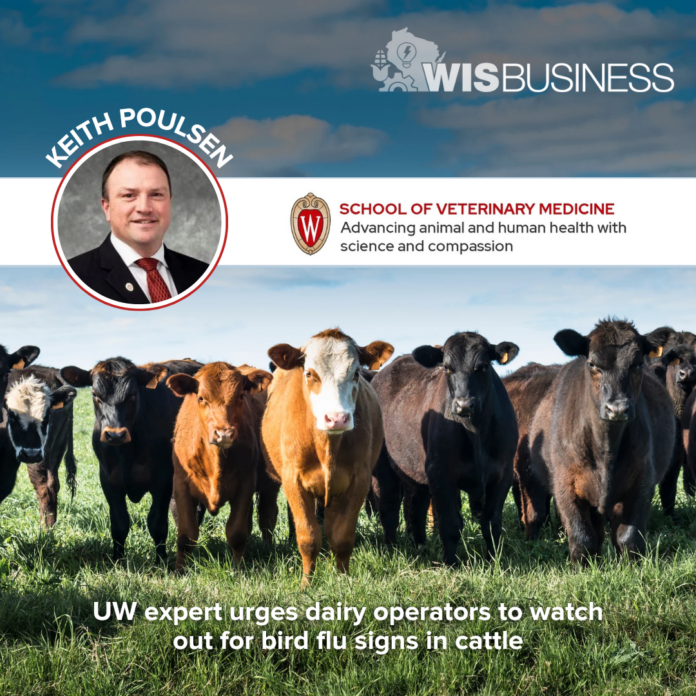A UW-Madison expert is urging dairy farm operators to watch out for signs of bird flu in their cows after cases of the virus were reported in herds in Kansas, Texas and Michigan.
While no cattle in the state have tested positive for the disease, according to DATCP, the agency is preparing for the possibility that it will hit dairy farms in Wisconsin.
Keith Poulsen, director of the Wisconsin Veterinary Diagnostic Laboratory, says the disease seems to be spreading from birds to cows, rather than between cows.
“Migratory birds are bringing this highly pathogenic avian influenza to cows, mostly infecting those that are later in their milk cycle … Investigations are currently underway in Michigan to determine if the disease was spread from cow to cow, or if birds remain the cause of spread,” he said in a release from UW-Madison.
Poulsen notes this strain of highly pathogenic avian influenza, otherwise known as bird flu, has been around since 2022.
“We need this virus to burn out of the environment,” he said. “We aren’t seeing it impact our domestic poultry flocks in Wisconsin during spring migration as of yet, so that’s good news for our poultry farmers. But other states are, and migration isn’t done yet, so we are watching very closely.”
Infected cows are eating less and displaying lethargic activity while producing less milk, according to the university. The milk they do produce is thicker and yellow in color, and many cows with the virus have body temperature between 103 and 106 degrees Fahrenheit, compared to the normal temperature of about 101.5 degrees.
“We want to hear about it rather than wait and see, because we want to know early if the virus is in Wisconsin,” Poulsen said. “If we get tests quickly, it also helps us minimize any spread and keep track of if that virus changes.”
Meanwhile, a DATCP spokesperson said the agency is following the spread of bird flu in cattle “very closely” and working with industry members and partner agencies to ready a response.
“It is important to know that normal practices on a dairy segregate sick animals from healthy milk cows, their milk does not enter the bulk tank,” the spokesperson said in an email. “If milk from a sick animal somehow entered the food supply, pasteurization would be sufficient to destroy influenza virus if present, as would properly cooking meat and poultry products.”
Although one person has reportedly been infected with bird flu in Texas after coming in contact with cattle, according to a New York Times article, Poulsen stresses the virus poses “a very low risk to public health” at this point.
UW-Madison notes there are currently no restrictions on moving animals between states, but DATCP says any cows being newly introduced to herds should be isolated first.






